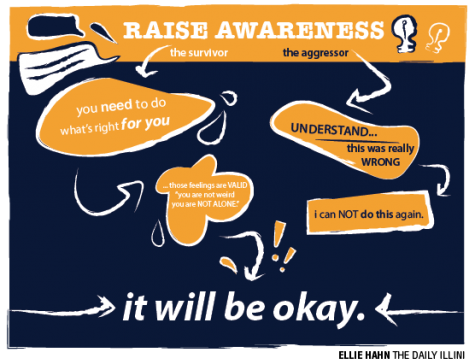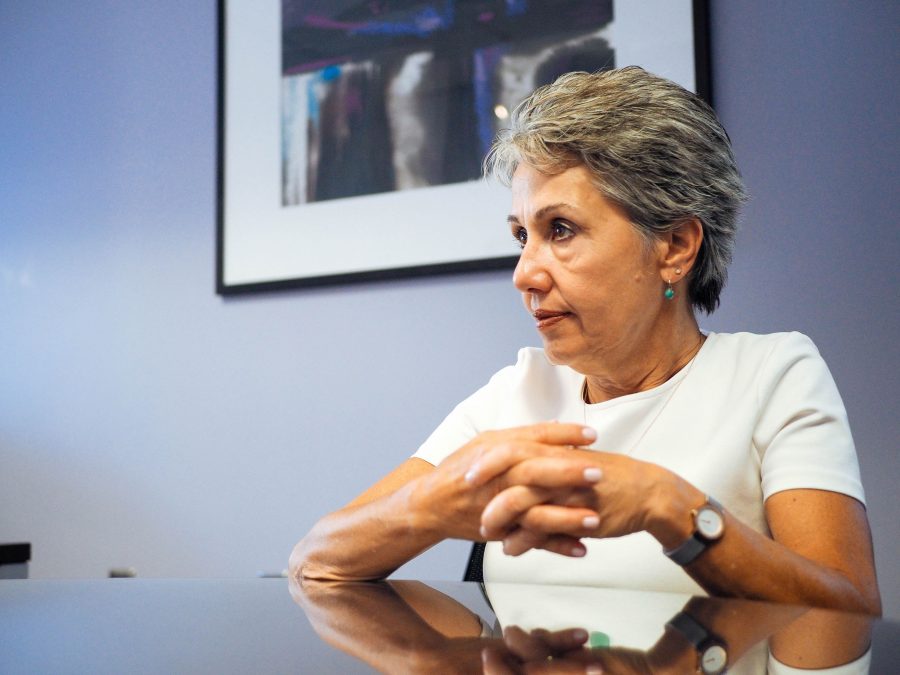Haven program challenges campus culture
Renee Romana, Vice Chancellor of Student Affairs, discusses the FYCare and iGuard programs at the Office of the Vice chancellor for Student Affairs in Champaign, IL. August 17, 2016.
Aug 22, 2016

This fall, the University is introducing another layer in student awareness about sexual assault. Haven is an online webinar required for everyone attending and employed by the University.
Coincidentally, this school year will be the 20th anniversary of First Year Campus Acquaintance Rape Education, FYCARE, a mandatory program for all incoming freshmen. Prompted by encouragement from student activists, the program was mandated in fall of 1996.
Molly McLay, assistant director of the Women’s Resources Center, said the University is a role model for other universities. She said others are often surprised at how the University pulls off multiple programs within a Big Ten school.
McLay explained that when more messages are enforced, the programs trying to raise awareness are more likely to make a difference. No student on campus has the exact same experience or education in terms of these topics. McLay said every University of Illinois campus wants to be on the same page in terms of what is being done about these issues.
Get The Daily Illini in your inbox!
The efforts of Haven are not being minimized to solely the Women’s Resources Center. Renée Romano, vice chancellor for student affairs, said the new program is meant to empower not only oneself, but also one’s friends and family members who have experienced assault.
“The hope is that you do something that appeals to everyone,” Romano said. “We know alcohol is related, (but we) don’t want to imply victims are at fault because they drank.”
Haven was created by the company EverFi and designed with survivors in mind. There is a button included to lead to additional resources if at any point the content of the program is too overwhelming for the participant. The program grants students the ability to go through the course at their own paces in their preferred environments. McLay said for FYCARE, the Women’s Resources Center encourages students to attend with friends, but Haven allows for personal space while delving into sexual assault.
The topics covered in the program can be narrowed down to three words: prevention, intervention and response. There is also a strong emphasis on how sexual harassment can be any action toward another individual when consent is not given.
Completing the program will be shorter than most classes students are registered for this fall; however, the skills ingrained in the program are designed to provide education for situations that are not contained to college campuses.
“We know that it is a long-term cultural shift that needs to happen,” McLay said.
This mentality is summed up by the second and third words, intervention and response, in the introduction page of Haven. By informing students, the Women’s Resources Center and the University is not expecting to eliminate these issues immediately, but through boosting awareness the desire is for conversations about sexual assault to sound differently.
Jesus Monroy, senior in LAS and FYCARE facilitator, explained how some people will disregard the program because they know themselves and trust themselves to not add to this culture of harassment. Monroy also said that if students think they do not need to take it for themselves, then they should take it for their friends and their communities.
The bystander is a crucial role played in the prevention of sexual assault. Students who are prompted to speak up and know what to say and how to say it will be the ones halting the victim statistic.
In addition to FYCARE, GUARD and ICARE are two programs developed in the last two years. GUARD is a five-hour course designed for members of Greek life to attend and bring the information back to their chapters. ICARE’s audience is primarily RSOs and smaller pockets of our community who want to have this discussion with and for everyone involved with their organizations. By generating more opportunities for conversation, the mutual intention is to know what to do when one sees and/or experiences sexual assault.
Monroy expressed understanding toward how sensitive and painful these conversations can be for certain people. Because students do not all share common ground with what they’ve seen and experienced, the depths of conversations being held can trigger unwelcome memories.
If victims are taking Haven or Haven Plus, the version of the program designed for freshmen, the University wants to accommodate them. By emailing the Title IX coordinator, [email protected], an understanding can be made if students are too overwhelmed to continue the program.
“You need to do what’s right for you,” Monroy said. He specified how emotions triggered by Haven are valid, and if a student experiences them, “you’re not weird, (and) you’re not alone.”
Victim is interchangeable with “survivor” when discussing sexual assault. Monroy explains how at moments, it may appear that all hope is lost; however, he stresses, “It is going to be okay.”






